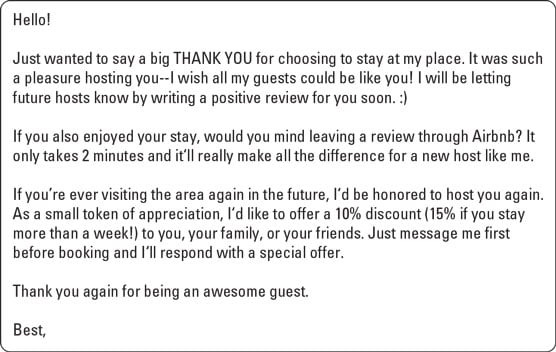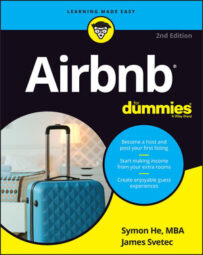After checkout is a great time to follow up with your guests and provide some incentives to encourage potential future bookings. You should also check the condition of your property, especially if you suspect any potential for damage or theft.
Assessing the state of your property
Whether you’re doing the turnover yourself or hiring a cleaner to do it for you, make sure you or the cleaner accesses the state of your property after your guest checks out. A simple checklist to account for the both the presence and condition of all major appliances and furniture will do.Filing a claim with Airbnb
If you find damage or missing items, take good photos for documentation and file a claim with Airbnb against the security deposit and/or Airbnb Host Guarantee right away. Include any written communications between you and the guest that corroborates or supports your claim, especially for any retaliatory damages.You have until your next guest check-in or up to 14 days to file a claim, whichever occurs sooner. In most cases, your window for filing a claim is just the few hours from the prior guest’s checkout to the next guest’s check-in, typically between 11 a.m. and 4 p.m., making it a smart move for you to assess your property during each turnover. After your next guest checks in, you can’t make a successful claim because the damage or theft could now be due to the next guest.
For minor claims that can be made on the security deposit, you can follow these steps:- Go to www.airbnb.com/resolutions.
- Click on “Request money.”
- Select the appropriate reservation to make your claim.
- From the “Select a reason” options, chose “Request compensation for damages.”
- Click on “Continue.”
- Type in details of specific damages or reasons for the claim and requested compensation amount.
- Submit to complete your request.
Following up with your guests
With guests receiving so many notifications from just about everywhere, many hosts are hesitant to add one more message to their guests’ inboxes. But sending a follow-up thank you note can make the all the difference for your performance.Send a thank you note within 12 to 24 hours after their checkout and include these three important items:
Expressing sincere appreciation
Share your sincere appreciation with your guests for choosing to stay with you. They could have chosen any other Airbnb listing in your area, but they chose to stay with you.Thank them for being great guests if they left your property in good condition and were otherwise pleasant for you to host. Not only will this prime your guests to be in a better mood when reading your note, it may also encourage them to look back at their stay through a more positive lens.
Asking your guests for a review
From our own survey of hosts, the percentage of their guests that leave reviews can range from as low as 30 percent to as high as 100 percent. Even though Airbnb now automatically sends emails to remind guests to leave reviews after checkout, these messages can get lost in their inboxes or guests may simply ignore them. Asking your guests to consider leaving you a review can drastically increase the percentage of your guests who end up leaving reviews.Asking is especially crucial if your listing is new with little to no reviews. Notify your guests that you’re quite new to hosting and that every review helps tremendously. Guests who’ve otherwise enjoyed their stay with you are typically eager to oblige.
In addition, Airbnb has many requirements when evaluating a host for Superhost status. One is that at least 50 percent of the guests who stay with the host end up leaving a review. By not asking your guests to leave a review, you risk falling below on this metric right from the start.Providing incentives for future stays
A good way to end your thank you note to your guests is to offer them an incentive to book a future stay with you. Many hosts offer a discount of 5 to 15 percent to former guests and their family and friends. Sample follow-up thank you note to guests
Sample follow-up thank you note to guestsThe sample note above hits on all three points: expressing sincere appreciation, asking for reviews, and offering value. Use the template to create your own.
For guests traveling to visit family for on an annual trip, they may well take you up on the offer. During low season periods, getting referrals can help you fill up some nights that otherwise would stay vacant.
Blocking out a day or two before and after reservations for preparation time
In rare situations, you may need to block a day or two in between reservations to have enough time to turn around and prepare the property for the next guests.Consider blocking off a day or two before and after each reservation if your property needs extra time for a proper turnaround. For example, if you have a listing within a large building and many amenities on a vast property where you and your cleaners require more than four to five hours to properly clean and turn, add the extra day or two in between reservations.
If you’re not seeking to maximize your profits and would prefer a more relaxed hosting experience, adding the extra day or two between reservations reduces the hectic chaos that could ensue for same-day turnarounds.However, adding this extra buffer means giving up those days of potential revenue because you’d be blocking those days off with each reservation that comes through. If your typical reservation lengths are short, say on average three days, then blocking off one day before and after takes your available days for booking down by 25 percent. The impact is less severe if your guests typically book long stays, such as losing a day or two for a three-week average stay length.
To block off one of two days between reservations, follow these steps:
- Log into your Airbnb account.
- Select “Availability settings” from your Calendar
- Select the dropdown menu under the “Preparation time” label with the coffee cup icon
- Select either “Block 1 night before and after each reservation” or “Block 2 nights before and after each reservation.”
- Select Save.
Choose the one-day option first to see if that’s enough time for you. You don’t need to block off more days than necessary unless you prefer the extra break between guests.

